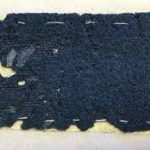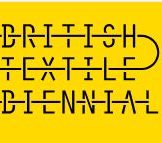
THE PENISTONE CLOTH – TEXTILES AND SLAVERY – FROM THE PENNINES TO BARBADOS AND BEYOND
At first glance it seems quite insignificant; a small, fragile piece of ancient blue cloth. However, this tiny, extraordinary fragment contains threads that stretch across the globe and weaves legacies that we continue to trace and unpick to this day. Lying hidden among old letters and accounts in Derbyshire for over 200 years, its story was recently uncovered through the discovery of its original 18th century label, which reads:
“Penistone sent for negro clothing 1783 which for substance, strength and unchangeable colour, is best adapted to that purpose.”
We now know that this was supplied to a slave owner in England as a sample for 410 yards of material he purchased to clothe the community of enslaved African people held at Turner’s Hall, Saint Andrew Parish, Barbados.
Penistone was a type of rough, cheap woollen cloth dyed with indigo, hand woven in West Yorkshire. This small sample is believed to be the only surviving example of British made “slave cloth” – a physical link between the millions of enslaved people in the Americas who were clothed in similar wools and linens and handloom weavers in the cottages and barns of Lancashire and Yorkshire whose meagre livelihoods relied on producing these fabrics.
Drawn from this unique object, the timeline and light installation in this exhibition reflect the worldwide connections of the Lancashire textile industry – the manufacturing hub connecting the profits of the enslavers, colonisers, and industrialists with the experiences of local textile workers, African captives whose lives were exchanged for British-made goods, Indigenous Americans massacred and marched from their homes to make way for cotton plantations, and South Asian spinners and weavers forced into poverty by colonial laws.
Historical Research
The Global Threads Research Team:
Sibia Akhtar
Katie Belshaw
Megan Bridgeland
Serena Robinson
Matthew Stallard
Design
Made by Mason
Projection Artwork
Illuminos
With thanks to Derbyshire Record Office for the loan of the Penistone Cloth.
Warning – The language in the exhibition is drawn from original documents and is repeated only where strictly necessary for sharing historical documents and accounts – not least written on the object itself.
